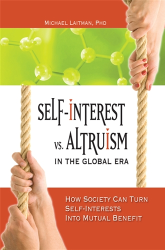The fundamental characteristic of any creature is self-concern, which brings about competitiveness. Simultaneously, evolution locks self-serving creatures into a completely interdependent system, creating a potentially devastating paradox…
The Thing that Separates Man from the Rest of Nature
On the lower levels of desire—in Stages One through Three, or on the inanimate, vegetative and animate levels of Nature—Nature mends the ties by itself. In the process of evolution, the elements in Nature that follow the rule of yielding self-interest before the interest of their host system survive and form the basis for the next level in evolution. The ones that do not yield their self-interests perish.
Thus, gradually, Nature built the universe, galaxies, our solar system, and planet Earth. Then, layer by layer, life on Earth was formed.
As biologist Elisabet Sahtouris so eloquently explained, initially each new creature conducts itself selfishly, oblivious to the existence and needs of other creatures. But the struggle among the creatures forces them, as she put it, to “negotiate,” eventually leading to the creation of homeostasis—the stability necessary for the persistence of life.
The Strange Reason Why the Desire to Be Superior to Others Forces You to Connect
In this manner, life on Earth evolved stage by stage until at Stage four in the evolution of desires, Homo sapiens appeared. Initially, humans were just like all other creatures. Just as desires evolve in the whole of Nature, our desires, too, evolved stage by stage, from Zero through Four. In Stages Zero through Two, the desires for greed, control, and cognizance were not potent enough to separate us from nature to a point that threatens our existence. Like all other elements of Nature, we were forced to negotiate and accept the power of the elements as one of life’s necessities. However, history shows we were not quite as pliable and tolerant toward other humans.
But roughly since the 15th century, Stage Three took hold. Since then, cravings for self-expression and personal excellence have been growing in us and expanding exponentially.
There is a peculiar quality to the desires for recognition and personal distinction. Although these desires reflect a self- centered nature, since they aim to present the individual who possesses them as superior to others, they also compel those who have them to connect to others. This is so because to be superior to others, one must measure one’s qualities, achievements, efforts, and possessions compared to those of others. If I do not compare myself to others, over whom can I be superior?
Thus, superiority dictates comparison, and hence forces the egocentric human of Stage Four to perpetuate connections with others. And the more egocentric we are, the more we want to feel superior to others, and are thus forced to tighten our connections to others.
In fact, the very word, “egocentric,” implies that there can also be another center to our thoughts. And the negative stigma attached to egoism implies that we instinctively know which direction is best for us—altruism, being “other-centric.”
The question is, “Why are we not acting like the rest of Nature, in the way that seems to be in our own best interest, as well?” The answer is that it seems it would be best if everyone were altruistic, but (save for very few) because of our egos, we want everybody else to go first. We all agree with the idea of altruism, but are paralyzed when it comes to executing it. Until we see that everyone else is doing it and know for certain that we will not lose by giving, we cannot give.
As a result, altruism does not seem like a good idea, but like a naïve one, even dangerous—if I were to go first and then were exploited. In consequence, Nature’s way, which seems like the right way for us, actually appears to be the wrong way in practice. This is why it seems unreasonable that we should choose it.
Are You Ready to Become an Altruist?
But at the same time, only the altruists survive. We are already connected, and we already affect one another, therefore harming each other with our treacherous intentions toward others. Put differently, our egoism is already taking its toll on us, so as we can see, the choice of altruism is both mandatory and utterly unappealing.
Yet, it is this unattractiveness that makes it a free choice. If it were appealing, we would do it automatically, following our egocentric intentions, and it would no longer be altruism, but disguised egoism all over again, which would lead to our eventual destruction.
But there is another reason why free choice is a must for us humans. According to Kabbalah, the purpose of Creation is to become like the Creator, just as the purpose of a child is to become a grownup, like its parents. And just as a child must learn to make choices freely on issues that concern corporeal life, Creation, meaning we, must learn to make choices freely in regard to spiritual life.
When Kabbalists refer to the spiritual life, they refer to choices whether to act out of egocentric motives or out of socio-centric or Creator-centric motives. In choosing to be socio-centric, one attains the purpose of one’s existence of becoming Creator-like, with all the capabilities and responsibilities that go with it.
You Don’t Have to Be Perfect to Start Imitating the Creator Today
Meltzoff and Prinz’s book, Perspectives on Imitation, describes the importance of imitation and identification with role models in rearing children. Yet, not only children learn this way; it is how we all learn. If we were not affected by each other’s wishes and behaviors, fashion would have been impossible, since no one would follow anyone else. Moreover, we would not progress, since nothing in our neighbors would evoke our envy and drive us to improve our own lives. This would halt the wheels of progress instantaneously. By performing acts of altruism we imitate the Creator—the life-giving force that creates and propels everything that happens. And just as children learn how to be grownups by imitating them, we will learn how to be like the Creator by imitating it, as well.
It could be argued with a great degree of merit that many people perform acts of altruism, yet none of them seems to have acquired the qualities or capabilities of the Creator. Indeed, the difference between the altruism we find on a day-to-day basis among many people, and the altruism proposed by Kabbalists is the intention. In “Peace in the World,” Baal HaSulam mentions the present type of altruism: “I am not saying that the singularity in us [the sensation that each of us is unique] will never act in us in a form of bestowal. You cannot deny that among us are people whose singularity operates in them in the form of bestowal upon others, too, such as those who spend all their money for the common good, and those who dedicate all their efforts to the common good.”
But when such people do good to others, they do it because it makes them feel good. In that, they are the same as any self- centered person—egoists who like to give. If they were born with a nature of enjoying hurting others, they would hurt others just as readily as they now give.
Baal HaSulam, and especially his son, Baruch (Rabash) suggest a completely different motivation for doing good to others. They suggest that people who agree on the purpose of Creation and wish to achieve it come together and do good for each other in order to become like the Creator. Clearly, they are just as egoistic as the rest of us, but their goal is different.
In “practicing” altruism in order to become it, these people discover their true nature, the nature of the Creator, and thus acquire the ability to freely choose between them. And just as children learn by imitation, gradually improving as they “practice,” people who wish to be like the Creator “practice” being givers until they acquire that nature, and thus achieve the purpose of creation.
 “To Be or Not to Be an Altruist” is based on the book, Self Interest vs. Altruism in the Global Era: How Society Can Turn Self Interests into Mutual Benefit by Dr. Michael Laitman.
“To Be or Not to Be an Altruist” is based on the book, Self Interest vs. Altruism in the Global Era: How Society Can Turn Self Interests into Mutual Benefit by Dr. Michael Laitman.

